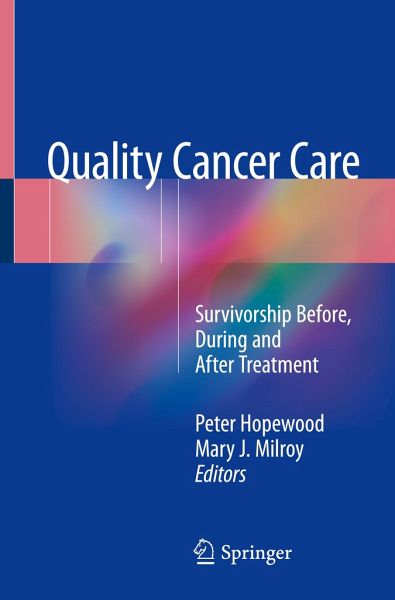
Quality Cancer Care
Survivorship Before, During and After Treatment
Herausgegeben: Hopewood, Peter; Milroy, Mary J.

PAYBACK Punkte
42 °P sammeln!
Maintaining quality and improving cancer care does not occur in a vacuum. It requires a coordinated effort among many team members to whom this book is directed. Cancer care in the United States is in crisis as per a recent National Institute of Health publication. Much of this has to do with the complexity of the cancer care, its delivery systems, the aging population and the diminishing workforce. We need to be smarter and more efficient to de-escalate this crisis and improve the survival and survivorship of our cancer patients. Improved survivorship of families and caregivers will be includ...
Maintaining quality and improving cancer care does not occur in a vacuum. It requires a coordinated effort among many team members to whom this book is directed. Cancer care in the United States is in crisis as per a recent National Institute of Health publication. Much of this has to do with the complexity of the cancer care, its delivery systems, the aging population and the diminishing workforce. We need to be smarter and more efficient to de-escalate this crisis and improve the survival and survivorship of our cancer patients. Improved survivorship of families and caregivers will be included as well.
The book will follow the continuum of cancer care model as its outline vide infra. It will provide many concrete instances of successful practices and programs which improve survivorship. Initially it will discuss the current crisis on a global and then national platform. There will be a discussion about disability adjusted life years lost, lost productivity, loss of life and its impact upon the nation and communities. The financial impact of cancer on society and government will be included in this. Population health management as regards cancer will then look at communities served, community health needs assessments and social determinants of health. How prevention and screening programs can be formulated from the above will be illustrated.
Compliance with treatments as promulgated by the Commission on Cancer's Cancer Program Practice Performance Reports (CP3R) will be reviewed. The relationship between compliance and improved survival will be highlighted. Navigation and distress management to assure patients complete planned treatments will be included in this section.
Quality of survivorship will review the four domains of life- spiritual, social, psychological and physical. How these can be maximized through system improvement and program development willbe illustrated. Financial issues and legal protections will also be included in this section. Survivorship care planning i.e. surveillance for recurrent cancer, prevention of related and new cancers will be an integral part of this section.
Palliative, end of life care and bereavement care will complete the continuum cycle. Identifying hospitalized patients in need of palliative needs will be refreshed. How to establish an in-patient palliative care team and creating a seamless transition from in-patient to out-patient palliative care will be presented.
Intended AudienceAdministrative and clinical staff involved in the delivery of cancer care including: hospital executives, physicians, nurses, radiation therapists, psychology counselors, social workers, physical therapists, occupation therapists, nutritionists, government, healthcare insurance representatives, etc.
The book will follow the continuum of cancer care model as its outline vide infra. It will provide many concrete instances of successful practices and programs which improve survivorship. Initially it will discuss the current crisis on a global and then national platform. There will be a discussion about disability adjusted life years lost, lost productivity, loss of life and its impact upon the nation and communities. The financial impact of cancer on society and government will be included in this. Population health management as regards cancer will then look at communities served, community health needs assessments and social determinants of health. How prevention and screening programs can be formulated from the above will be illustrated.
Compliance with treatments as promulgated by the Commission on Cancer's Cancer Program Practice Performance Reports (CP3R) will be reviewed. The relationship between compliance and improved survival will be highlighted. Navigation and distress management to assure patients complete planned treatments will be included in this section.
Quality of survivorship will review the four domains of life- spiritual, social, psychological and physical. How these can be maximized through system improvement and program development willbe illustrated. Financial issues and legal protections will also be included in this section. Survivorship care planning i.e. surveillance for recurrent cancer, prevention of related and new cancers will be an integral part of this section.
Palliative, end of life care and bereavement care will complete the continuum cycle. Identifying hospitalized patients in need of palliative needs will be refreshed. How to establish an in-patient palliative care team and creating a seamless transition from in-patient to out-patient palliative care will be presented.
Intended AudienceAdministrative and clinical staff involved in the delivery of cancer care including: hospital executives, physicians, nurses, radiation therapists, psychology counselors, social workers, physical therapists, occupation therapists, nutritionists, government, healthcare insurance representatives, etc.












